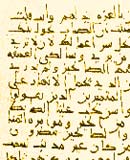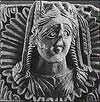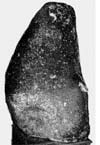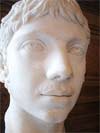Islam – Final Revelation or Ultimate Heresy?
Thought for the Day
“Instead of a perpetual and perfect measure of the divine will, the fragments of the Koran were produced at the discretion of Mahomet; each revelation is suited to the emergencies of his policy or passion; and all contradiction is removed by the saving maxim that any text of Scripture is abrogated or modified by any subsequent passage.”
– Edward Gibbon.
The recorded revelations of the prophet were stored in a chest in the custody of one of his wives. After Muhammad’s death these gems of wisdom and divine guidance were collected into a sacred volume, subsequently edited under the instruction of caliph Uthman – quite a challenge for twenty two years of ‘thoughts’. The arrangement is neither chronological nor thematic but simply (after a brief prologue) from longest to shortest. In the original Arabic it is, apparently, extremely poetic, a charm lost in translation.
Thought for the Day
As the birth of literacy in a pre-literate society the Koran contains no direct quotes from either the Old or New Testaments – but the fables are painfully familiar.
From Judaism:
Monotheism. God (‘Allah’ in Arabic) rules supreme. He is all-powerful, all-knowing, and all-merciful – and alone. But most of the time the Islamic god does not have Yahweh’s ‘humanoid’ characteristics.
(Having said that, Satan – aka ‘Malik’ – has a place in the saga)
Legends of the Prophets. Throughout history (well, semitic history) God has sent messages and laws to ‘prophets’ to guide humanity.
New twist: Muhammad is another – and last – such prophet. A bright star announces his birth.
Unlike Judaism’s prophets – sinners full of human frailty – in Islam the same cast of characters are paragons of piety and ‘righteousness’.
Fables of Origins.
First man, Adam, was expelled from Paradise for eating from the forbidden tree.
(New twist: Satan appears but not as a serpent, both Adam and Eve equally tempted, but repent and are forgiven – and thus ‘pains of childbirth’ not God’s punishment of Woman.)
Righteous man Noah built an ark to save a select few from a flood brought on by the wrath of God.
New twist: No inherited ‘original sin’; children born ‘pure’. No atoning blood sacrifice required. (Eat your heart out, JC!)

The church towers of Byzantine Syria – the earliest minarets, square rather than round.
Fables of the Patriarchs & Biblical Heroes:
Includes Abraham (aka Ibráhím) and his son Ismá’íl (Ishmael); story of sacrifice of Isaac (Isháq ) at God’s bidding. Sura 37: 100
Lút (Lot), Ya’qúb (Jacob), Yúsuf (Joseph), Ayúb (Job). Hárún (Aaron), Dhu l-kifl (Ezzekiel), Dawúd (David), Sulaimán, Ilyás (Elijah), al-Yasa’ (Elisha), Yúnus (Jonas), Zakaríya (Zakariyah)
New twist: prophets Hud and Saleh and the stories of the people of Ad and Thamud (predictable tales of rejected righteous prophets and divine retribution.)
Fable of the Exodus:
Moses (Músa) led the Israelites out of Egypt and received a revelation on Mount Sinai.
Moses quoted (though not always accurately) more than one hundred times in the Koran
ixed Law embodied in scripture: Preaching an end to licentiousness and need for peace, justice and social responsibility, Muhammad advocated improving the lot of slaves, orphans, women and the poor, and replacing tribal loyalties with the fellowship of a new monotheistic faith – which he called Islam, meaning ‘surrender to God.’
Mosaic laws about circumcision and ablutions to be obeyed; prohibition against eating pork, interdiction of images.
New twist:When Muhammad gave up on the Jews the Sabbath was changed to Friday and the direction of prayers changed from Jerusalem to Mecca.
Friday Gathering:
“Islam enjoins Muslims to gather every Friday for communal worship. This practice had evolved in Medina where Jews had gathered on Friday for the weekly market before the Saturday Sabbath.” (Bloom, Blair, Islam p109)
“Islam enjoins Muslims to gather every Friday for communal worship. This practice had evolved in Medina where Jews had gathered on Friday for the weekly market before the Saturday Sabbath.” (Bloom, Blair, Islam p109)
Judgement Day. God will bring about the end of the world and the Day of Judgment.
From Various Christianities:
John the Baptist (Yahyá) – not merely a fore-runner but a prophet.
Mary and her Virgin birth.
Jesus (‘Isa’) is born of the Virgin Mary and is the Messiah of the Jews, a great prophet (but only human and not divine).
New twist: baby Jesus’ miraculously speaks from his cradle and he fashions a living bird out of clay.
New twist: a substitute takes JC’s place on the cross therefore is not crucified but ‘raised to heaven’ unharmed.
Rejection of ‘Trinity‘ (Christian orthodoxy after 381).
New Twist: the Trinity rejected is that of ‘God, Mary, Christ’ – a source of huge derision from Christian apologists but actually the doctrine of an Arabian/Christian sect, the Collyridians.
New Twist: the Trinity rejected is that of ‘God, Mary, Christ’ – a source of huge derision from Christian apologists but actually the doctrine of an Arabian/Christian sect, the Collyridians.
New twist: considerably more alluring – for men: 72 ‘houris’ each!

A form of prayer with bowings and prostrations copied from the pew-less Christian churches found across the Levant.
By claiming descent direct from Abraham (‘the first Muslim’) Islam trumps rival claims of precedence.
From the tradition of Christian ‘desert fathers’ – both the Arabia ‘Hanifs’ – monotheistic hermits – and the later Sufi mystics .
Ramadan is, in fact, nothing more than an Islamised Lent (the eastern Christian churches still hold an all-day fast.)
Divinely sanctioned conquest
It became the duty of every Muslim man to make war on unbelievers
It became the duty of every Muslim man to make war on unbelievers
O Prophet! Strive against the disbelievers and the hypocrites! Be harsh with them. Their ultimate abode is hell, a hapless journey’s end.
– Surah 9.73
O ye who believe! Fight those of the disbelievers who are near to you, and let them find harshness in you. – Surah 9.123
In most Islamic cities the congregational mosque was/is located in the town centre, within or close by a large market (‘suq’ or bazaar). Unlike Jews or Christians, Muslims are required to stop work only during the communal prayer, not for the entire day.
Paganism
Just like Christianity, Islam owes a debt to paganism. Paganism is part of its theology, history, ceremony, and veneration.
Black Stone:
About 60 BC, the Roman historian Diodorus Siculus commented that there was in Arabia a temple ‘greatly revered by the Arabs.’
Ptolemy, the geographer, mentions it in his work, calling it the ‘macoraba.‘
Muhammad incorporated the Kabah’s pagan roots into Islam to give the Muslims a sense of identity, legitimacy, and uniqueness. He also wanted to ease the Arabs’ strain of moving from paganism to Islam, by continuing the practices of their fathers.
New twist: The Ka’bah of Mecca was built not to honour the black meteorite but Abraham himself, who supposedly built a shrine on the same spot – (Sura 3:97)
Allah’s Daughters:
When facing resistance from the polytheistic Quraysh tribe Muhammad appears to have wavered in his monotheism. At one stage he commanded his followers to offer prayers to ‘Allah’s three daughters’ – al-Lat, al-Uzza, and Manat, each of which had a shrine near Mecca.
“These are the exalted cranes Whose intercession is to be hoped for.” (Surah 53:19-22)
He later retracted that particular ‘revelation’ and blamed it on a trick by the Devil – hence, the ‘Satanic Verses.’
Muhammad keenly recognized the religious and economic importance of retaining the pilgrimage to Mecca.
There were 360 idols around the Kabah (a connection with the celestial orb seems clear). Paintings of Jesus and Mary were said to have been on the inner wall of the Kabah.

The black stone of Mecca. Actually now in several pieces.
The goddess Manat (‘Fate’) seemingly has a ghostly presence in Islamic ‘fatalism’ – the perception that everything is under God’s control.
Islam's "Dead Sea Scrolls"?
Muhammad’s ‘divine revelations’ were apparently memorized by his followers or inscribed on camel shoulder bones, leather and wood. Not until 650 – 40 years after the earliest – were the various utterances (‘suras’) compiled into a single Koran commissioned by caliph Uthman and issued as the ‘authorized’ version throughout his empire.
t seems that in the Himyarite kingdom in the south heterodoxy had flourished …
Yemeni 7th/8th century Koranic fragments
Discovered in 1972 during restoration of the Great Mosque of San’a, tens of thousands of fragments of a thousand early Korans – and not all of them identical.
Could it be Islam’s ‘Word of God’ – like the Christian version – needed a little judicious editing??
Sources:
- W. Cook & R. Herzman, The Medieval World View (OUP, 1983)
- John Gribbin, Science a History (Penguin, 2003)
- William Dalrymple, From the Holy Mountain (Flamingo, 1998)
- N. H. H. Sitwell, Outside the Empire-The World the Romans Knew (Paladin, 1984)
- Edward Gibbon, Decline & Fall, Chapters 50-52 The Coming of Islam, Arab Conquests
- M. Brett, W. Forman, The Moors, Islam in the West (Orbis, 1980)
- Justin Wintle, History of Islam (Rough Guides, 2003)
- J. Bloom, S. Blair, Islam – Empire of Faith (BBC Books, 2001)
- J. J. Norwich, Byzantium, The Early Centuries (Viking, 1988)
- C. McEvedy, The Penguin Atlas of Medieval History (Penguin, 1987)
- Robert Marshall, Storm from the East (BBC Books, 1993)
Related articles:
Arabia the Happy – Life Before Islam
Who Saved Civilization? – Damascus Spring
Islam – Final Revelation or Ultimate Heresy?
Who Saved Civilization? – Baghdad Summer
Seeding the Renaissance – Science and Islam
Extinguishing the Light – Wrath of God
The Old Testament in Arabic (9th century)
Nestorian Christians were employed by the caliphs to translate ancient Greek texts.

Islam's early battle grounds
“The religions of the Sabians and Magians, of the Jews and Christians, were disseminated from the Persian Gulf to the Red Sea.”
– Edward Gibbon.
What Goes Around Comes Around
“The Latin church has not disdained to borrow from the Koran the immaculate conception of his virgin mother.
It is darkly hinted in the Koran, and more clearly explained by the tradition of the Sonnites.
In the twelfth century, the immaculate conception was condemned by St Bernard as a presumptuous novelty.”
– Edward Gibbon.

Al-Uzza – as grain goddess.
Symbol of Sîn – the pre-Islamic Moon god, and Uzza the pre-Islamic evening star
Meteorites – Fiery Gods?
A meteorite entering the atmosphere would not only look spectacular as it fell to earth – in the desert wastes it would readily be found.
In a pre-scientific age the only possible explanation for the phenomena would be ‘divine’.
Sacred black stone, this one the goddess Aphrodite from Paphos, Cyprus. Worshiped as early as the 12th century BC.


Elagabalus (Roman Emperor 218 – 222) – an original black stone enthusiast.
The teenage transvestite from Emesa, Syria (the only Roman to wear a dress of pure silk) promoted a universal sun god religion based upon worship of a black meteorite.
As chief priest of the cult he had his favourite stone set up in its own temple in Rome.
